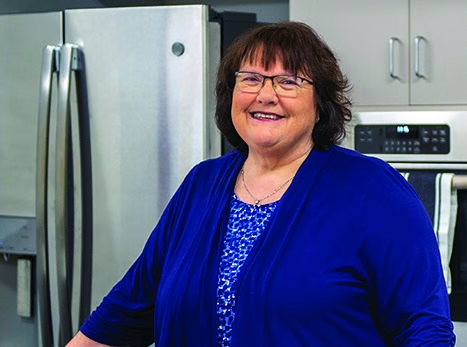Bonnie Dunn, Class of 1972
WVSU Extension Specialist
WVSU Extension Specialist Bonnie Dunn’s journey at STATE dates back to a rather sputtering start as a freshman student more than five decades ago.
“I walked onto campus in 1966, scared half to death,” says the Rand, West Virginia, native about her first semester at what was then West Virginia State College. “The campus was humming, a hub of activity. I stood there in the student union, a little overwhelmed, trying to figure out how to register for my classes.”
Dunn soon found her footing with the help of caring and supportive faculty members who went out of their way to help her succeed in her goal of becoming a home economics teacher. At the time, STATE had a comprehensive vocational program in home economics, which included a semester living in what is now Campbell Conference Center, managing the facility as though it was a home.
“I was struggling with my science classes,” Dunn recalls. “And my chemistry professor, Tom Cabell, took a personal interest in seeing me succeed.”
Dunn found herself on academic suspension for poor performance when Cabell encouraged her to return to the classroom and offered to tutor her through her science requirements.
“I was working at the Diamond Department Store in Charleston, and Mr. Cabell would come in there and say, ‘Ms. Dunn, you’re coming back to school.’ And I’d say, ‘I don’t know, Mr. Cabell. I don’t think I’m smart enough to do it.’ He said, ‘Yes you are. You just need help.’ And he provided that help.”
When Dunn graduated in 1972, Cabell was waiting at the edge of the stage with a handshake and a hug. Using Cabell as a model of what an educator can be, she went to work teaching home economics. Her career path ventured into other facets as the years passed. She worked for a time as an extension agent with West Virginia University, ran a statewide program for the Higher Education Policy Commission, and eventually found her way back to STATE as a Family and Consumer Sciences specialist with WVSU Extension Service.
“I didn’t look at it at first thinking, ‘I’ve come home,’” she says. “But as the years have gone by, I’ve realized that that’s what happened.”
Dunn will have been back at STATE 17 years in 2020 and is busier than ever. In 2015, she teamed with now-retired Department of Social Work Chair Dr. Brenda Wamsley to launch the WVSU Healthy Grandfamilies program, which provides education, resources and support to grandparents who are raising their grandchildren. After a pilot project in and around Kanawha County proved successful, the program has expanded statewide. Today, all 55 West Virginia counties (as well as areas of Kentucky, New Hampshire and Guam) have been trained to run their own versions of the program, and Dunn is working to establish a Center of Excellence for Grandfamilies on campus.
“We never dreamed in our wildest imagination that this program would get this big, this fast,” Dunn says, noting that the issue – both in West Virginia and nationally – is becoming an epidemic. West Virginia currently ranks second in the nation, behind Arkansas, as having the highest percentage of grandparents raising grandchildren, a family dynamic that is largely tied to the opioid epidemic.
It’s a mission that Dunn, herself a product of a grandparent-led home, is happy to adopt at this stage in her career — and a legacy she is proud to leave behind. Now in her 70s, Dunn is working to ensure that the WVSU Healthy Grandfamilies program continues to help the people of West Virginia get the help they need.
“I suppose I want my legacy to be that I cared, and that I was willing to fight for citizens that needed an advocate, a voice. My name can get lost, that’s not important. But my hope is that this program model will continue, because it truly works.”
Dunn is proud that West Virginia State University is at the forefront of addressing the issue, and credits her time as a student with laying the foundation.
“It truly did start at STATE and with caring faculty members like Mr. Cabell,” she says fondly. “It was the foundation from which to build on, and I hope that I’ve made West Virginia State University proud of the fact that I graduated from here.”
In the 1990s, shortly before he died, Dunn had a chance reconnection with Cabell while attending a meeting on campus.
“I’ll never forget that day,” she says. “I had not seen him since I graduated in 1972. I got to express to him, as finally a mature adult who had become successful, how much his dedication as an educator meant to me and that his example was a model for me to be a dedicated educator.”
